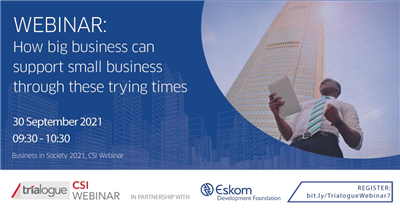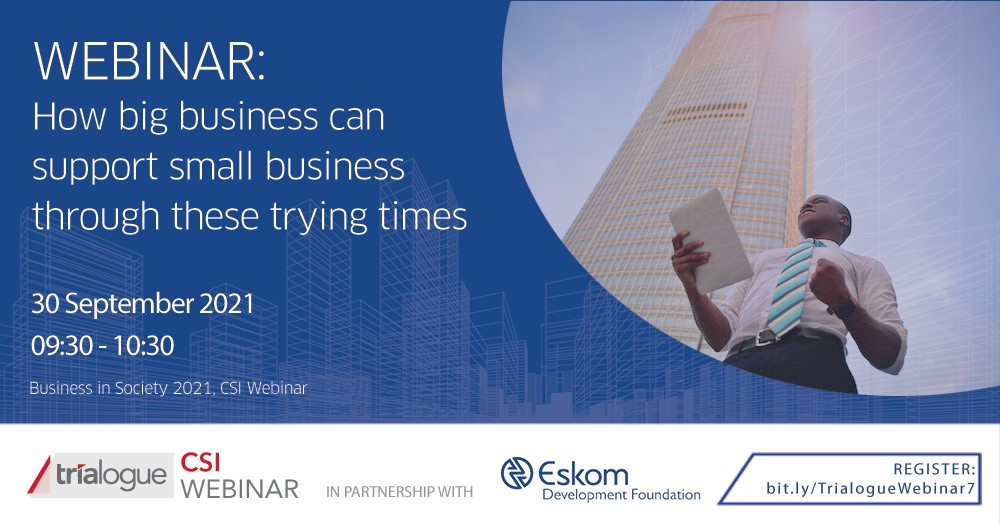Eskom and Trialogue partnership highlights role of big business in enterprise development
Published: Tuesday, October 5, 2021
With the current gloomy economic outlook, Eskom encouraged big businesses to come to the table to help small and medium enterprises at a webinar hosted by Trialogue Consulting on 30 September 2021.

Trialogue, a niche CSI consultancy, provides thought leadership in the sustainability and corporate social investment (CSI) space and hosts monthly webinars focusing on a range of CSI-related topics. Earlier today, the Trialogue webinar, presented in partnership with the Eskom Development Foundation, unpacked how big business could leverage its corporate social investment to help support the development and growth of small, medium, and micro enterprises (SMMEs), particularly through these challenging times of COVID-19.
The event was attended by more than 260 delegates from non-profit organisations, CSI practitioners, big businesses, SMMEs, government, consultants, and academics. The hour-long webinar panel comprised Eskom Development Foundation CEO, Cecil Ramonotsi, entrepreneur and Eskom’s 2020 Business Investment Competition winner, Nomawethu Sotshongaye, and Kevin Stroud, Supply Chain Manager at Sibanye-Stillwater.
Trialogue’s Director, Cathy Duff, who facilitated the webinar, gave an overview of the current economic outlook of the country, which negatively affected the small business sector in a major way, stating that 7,8 million unemployed South Africans relied on small enterprises for job creation. “SMEs represent over 98% of South Africa’s businesses and employ around 60% of the country’s workforce. The sector was badly impacted by the pandemic, with reports of around 19% of SMEs having closed down in 2020,” she stated.
Many corporates and companies have contributed massively to COVID-19 relief efforts. Cecil Ramonotsi expressed the view that the challenge now lay in sustaining this support as we moved towards a post-pandemic society and in ensuring that the socio-economic gaps that had widened during this period could be rapidly narrowed.
“The economic landscape is being fundamentally reshaped as we emerge from COVID-19, and this process will have lasting impacts on the way in which we participate in corporate social investment initiatives,” he added. “The Eskom Development Foundation has been active for more than two decades in initiatives that benefit grassroots communities across a range of activities – from healthcare and education to support for innovation and emerging entrepreneurs. We currently support three CSI flagship projects and a number of national programmes,” said Ramonotsi. Ramonotsi highlighted some of Eskom’s programmes, including Simama Ranta, which encourages entrepreneurship among high school learners, the Business Investment Competition aimed at developing small enterprises, and Eskom’s Contractor Academy, which offers skills training to emerging contractors.
“Our own programmes confirm our position that Eskom is about much more than power generation and keeping the wheels of the economy turning. We are, in the first instance, an organisation that is committed to sustainable growth, job creation, and the economic upliftment of communities,” he stated. The Eskom Development Foundation CEO explained how Eskom’s CSI approach had shifted in relation to enterprise development towards interventions aimed at creating an enabling environment for black industrialists to prosper.
He said that targeted investment in enterprise development over the long term was crucial, as a quick-fix approach and short-lived campaigns would not produce the desired outcome. “The Eskom Development Foundation has developed a holistic approach to enterprise development, one that not only focuses on a financial injection to boost small enterprises, but also focuses on capacity building, exposure to markets, and exposure to quality business training to enable the entrepreneurs to navigate difficult economic times,” he said.
Ramonotsi expressed the opinion that the recovery of South Africa’s economy would require big business to play a role in the empowerment of South Africans through asset creation, wealth creation, and skills development to produce a new generation of trained, qualified, and assertive job creators.
